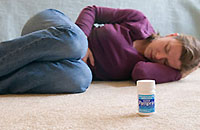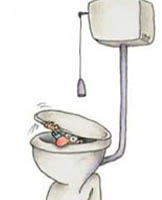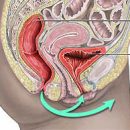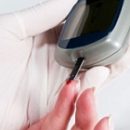Urinary incontinence is a symptom of a variety of diseases in which unpromanded urine release without a call.
Content
Causes of urinary incontinence in men
The reason is not always the age, often the problem occurs after the transferred operation on the prostate or any diseases of the urinary tract.
The severity of the symptom can be different: from the selection of several drops during physical stress to constant urine leakage.
Several types of incontinence in men are distinguished:
- Stress (occurs with laugh, cough, physical exertion, which leads to involuntary allocation of urine due to the increase in pressure in the bladder)
- Urgent (characterized by the fact that a man feels that he has a call, but can not control it. This type of incontinence happens with diabetes, after stroke, in Parkinson's disease)
In addition, incontinence can be:
 primary (anatomical sphincter defects)
primary (anatomical sphincter defects) - Secondary (functional insufficiency of anatomically saved sphincters)
The main reasons for urinary incontinence in men:
- The consequences of the prostate operations (most often about prostate cancer)
- bladder infections and lower urinary tract
- Neurological diseases (Parkinson's disease, sclerosis)
- Head or spinal cord injuries
- High doses of sedative preparations used for medication treatment
- Inxication of the body (alcohol)
- Mental diseases
- stress
Treatment of urinary incontinence
Is to eliminate the reasons that led to the appearance of this symptom.
Treatment of urinary incontinence can be carried out by drug or surgically. Previously, the basis of treatment was physical exercises for strengthening the muscles of the pelvic bottom. However, they did not bring much benefit.
In the presence of infection in the urogenital system, drug therapy is prescribed, but it helps only men with a light form of incontinence. Currently, with the help of modern surgical methods, most patients can be delivered from urinary incontinence. The surgical method of treatment is necessary for men with partial or complete incontinence after surgery on the prostate gland, with neurological diseases, various injuries of the head or spinal cord.
Such an operation lasts about two hours, during which an artificial sphincter is installed through a cut on the crotch. After the operation, antibacterial therapy is carried out to prevent the development of infection.
In the hospital, the patient is about a week. After discharge, it is necessary to limit physical activity within 2-6 weeks and completely abandon the sex until the sphincter activation occurs (1-2 months after the operation). The activation of the sphincter conducts a doctor who explains how to use it.









